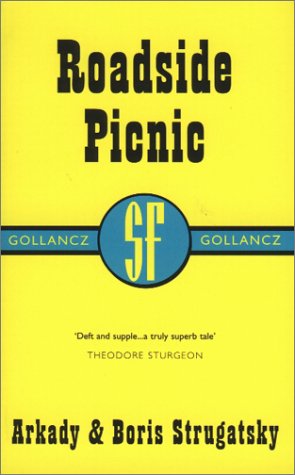 Autumn in Scotland is possibly even more difficult for me than it always has been. I love the light of spring and summer in the north so much, when even at midnight there is still a residual brightness in the sky. I like to encourage myself by thinking of all the work I need to get done between now and next March! I’ve been rereading Arkady and Boris Strugatsky’s Roadside Picnic this week, for a non-fiction project I’m working on, and I could feel my heart rate increasing as I turned the first page.
Autumn in Scotland is possibly even more difficult for me than it always has been. I love the light of spring and summer in the north so much, when even at midnight there is still a residual brightness in the sky. I like to encourage myself by thinking of all the work I need to get done between now and next March! I’ve been rereading Arkady and Boris Strugatsky’s Roadside Picnic this week, for a non-fiction project I’m working on, and I could feel my heart rate increasing as I turned the first page.
There are certain novels – and I’m sure it’s like this for every science fiction reader – from which you only need revisit a couple of pages to be reminded of why it is that you’re crazy about science fiction. Novels that churn up memories so powerful they bring tears to your eyes. You know there are no novels quite like this in mimetic literature, that in some incalculable yet inarguable way they articulate what being a reader and being a writer is about. Resistance to consensus. Provocation. The opposite of what Don DeLillo has called the corporatisation of the writing classes.
It could be something about the story itself, or the form the novel takes, or a combination of both. A rawness of purpose and of expression, a determination to say something unexpected and necessary, together with the urgency of saying it. Touchstone novels, the ones you would give a friend to read if they came to you with the question: why SF?
“The sidewalk was coming closer and the boot’s shadow was falling on the bramble. That’s it. We were in the Zone! I felt a chill. Each time I feel that chill. And I never know if that’s the Zone greeting me or my stalker’s nerves acting up. Each time I think that when I get back I’ll ask if others have the same feeling or not, and each time I forget.”
The same feeling I experienced the first time I set off with Will on his journey to the White Mountains in John Christopher’s Tripods trilogy, or sat down with the doctor and teacher to watch that first extraordinary demonstration of a new technology in H. G. Wells’s The Time Machine. That sense of apprehension and excitement that says the world is not, or not entirely, what we think we perceive.